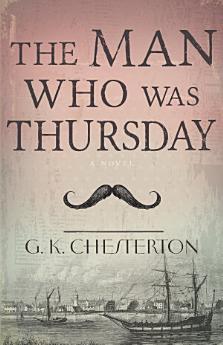The Man Who Was Thursday
ก.พ. 2014 · Whitaker House
eBook
192
หน้า
family_home
มีสิทธิ์
info
reportคะแนนและรีวิวไม่ได้รับการตรวจสอบยืนยัน ดูข้อมูลเพิ่มเติม
เกี่ยวกับ eBook เล่มนี้
“A powerful picture of the loneliness and bewilderment which each of us encounters in his single-handed struggle with the universe.”
—C. S. Lewis
Part detective story, part surreal thriller, and part social commentary, The Man Who Was Thursday is a masterpiece of literary fiction by the brilliant G. K. Chesterton. The story centers around seven anarchists in turn-of-the-century London who call themselves by the days of the week. Fearing an impending act of terrorism, Gabriel Syme is sent by Scotland Yard to infiltrate their ranks by becoming “Thursday.” Elected undercover into the Central European Council of anarchists, Syme must avoid detection and save the world from future bombings.
Beyond the excitement of an elephant chase, duels, elaborate disguises, and a hot-air balloon pursuit through the streets of London, Chesterton is most interested in the battle of ideas. Indeed, his real agenda is to expose the moral relativism and parlor nihilism of his day as the devils he believed them to be. Chesterton’s classic novella tackles anarchy, social order, God, peace, war, religion, and human nature, somehow managing to combine them all into a delightful tale full of biting social commentary that is still relevant today.
—C. S. Lewis
Part detective story, part surreal thriller, and part social commentary, The Man Who Was Thursday is a masterpiece of literary fiction by the brilliant G. K. Chesterton. The story centers around seven anarchists in turn-of-the-century London who call themselves by the days of the week. Fearing an impending act of terrorism, Gabriel Syme is sent by Scotland Yard to infiltrate their ranks by becoming “Thursday.” Elected undercover into the Central European Council of anarchists, Syme must avoid detection and save the world from future bombings.
Beyond the excitement of an elephant chase, duels, elaborate disguises, and a hot-air balloon pursuit through the streets of London, Chesterton is most interested in the battle of ideas. Indeed, his real agenda is to expose the moral relativism and parlor nihilism of his day as the devils he believed them to be. Chesterton’s classic novella tackles anarchy, social order, God, peace, war, religion, and human nature, somehow managing to combine them all into a delightful tale full of biting social commentary that is still relevant today.
เกี่ยวกับผู้แต่ง
G. K. (Gilbert Keith) Chesterton (1874–1936) was an English writer, philosopher, satirist, and social critic. During his lifetime, the prolific Chesterton wrote eighty books, several hundred poems, some two hundred short stories, four thousand essays, and several plays. He was also known as a strong debater and Christian apologist. He often took on what he considered to be the flawed philosophy of modernism found in the writings of his good friends Oscar Wilde and George Bernard Shaw. It was Shaw who once referred to Chesterton in Time magazine as “a man of colossal genius.” Chesterton’s writings consistently displayed wit and a sense of humor. His ingenious use of paradox in his commentaries on the leading political, economic, philosophical, and theological beliefs makes his writings as relevant today as they were in his day.
ให้คะแนน eBook นี้
แสดงความเห็นของคุณให้เรารับรู้
ข้อมูลในการอ่าน
สมาร์ทโฟนและแท็บเล็ต
ติดตั้งแอป Google Play Books สำหรับ Android และ iPad/iPhone แอปจะซิงค์โดยอัตโนมัติกับบัญชีของคุณ และช่วยให้คุณอ่านแบบออนไลน์หรือออฟไลน์ได้ทุกที่
แล็ปท็อปและคอมพิวเตอร์
คุณฟังหนังสือเสียงที่ซื้อจาก Google Play โดยใช้เว็บเบราว์เซอร์ในคอมพิวเตอร์ได้
eReader และอุปกรณ์อื่นๆ
หากต้องการอ่านบนอุปกรณ์ e-ink เช่น Kobo eReader คุณจะต้องดาวน์โหลดและโอนไฟล์ไปยังอุปกรณ์ของคุณ โปรดทำตามวิธีการอย่างละเอียดในศูนย์ช่วยเหลือเพื่อโอนไฟล์ไปยัง eReader ที่รองรับ








